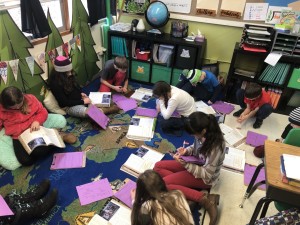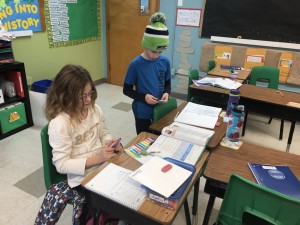Literatura
It was so great to hear all the fun things everybody did during winter break. As usual, we started this short week with our community circle where students had a chance to share some of the fun moments spent with family and friends. It is always great to see them come back so ready to speak Spanish!
The beginning of the year brings a new opportunity for a fresh start. We set individual goals that we expect to accomplish during the year. We also had a very interesting discussion(debate) about the concept of “new year’s resolutions”. This provided me with a great opportunity to assess their oral comunication.
The new Literacy unit for January is “The Birth of a Nation”. This unit offers students the opportunity to learn about the people, places and events that were instrumental to the founding of our nation, all of this while continue to develop their language skills in a meaningful and rich context. We are already looking forward to it.
Lastly we reviewed our class routines and expectations:
- Daily recording of school work on their planners.
- 15 minutes of Spanish reading every day.
- Spelling lists go home on Friday, and spelling sentences are due on Monday.
- Spelling quizzes take place on Fridays.
Ciencias
This winter in Science, our class will be studying Living Systems. This module has four investigations that focus on systems. The idea of a system is one of the grand integrating (cross-cutting) concepts that pervades all of science. Students start by looking at Earth as the interaction of four Earth systems or subsystems—the geosphere, the atmosphere, the hydrosphere, and the biosphere. The focus of the module then turns to the biosphere as students explore ecosystems and organisms in terms of their interacting parts. As a small homework piece, students were asked to explain to their families some of the concepts we will be seeing this term.
The overarching goals for this winter in science are to:
- Analyze everyday systems and subsystems.
- Analyze food chains and food webs as a way to study the biosphere.
- Make and analyze a habitat as a decomposition system.
- Investigate nutrient-getting systems of yeast, plants, and animals, including humans.
- Investigate and model transport systems in plants and animals.
- Investigate sensory systems in animals.
History & Geography
This week we began our new unit, England: Golden Age to Glorious Revolution. Our objectives were:
- Identify Henry VIII as the king who started the Church of England because he wanted to remarry and have a male heir.
- Explain why Elizabeth I became queen, following Mary I’s death.
- Describe how Elizabeth I kept peace between the Catholics and Protestants in England and Sir Francis Drake’s activities and his importance to Queen Elizabeth and England.
- Summarize British exploration during the Elizabethan era, including voyages to North America and the defeat of the Spanish Armada.
Students also brought home their field trip permission slip forms this week! They are due by next Thursday and our field trip is January 16th!
Mathematics
This week we began our new chapter, Algebra! Our objectives were:
- recognize, write, and evaluate simple algebraic expressions in one variable
English Word Work
This week we began our new rotation. Our rotation days were:
- Word Search: Students received a word search with their new spelling words. They were tasked with finding and sorting their new words.
- Teacher Meeting: I met with each student to discuss and clarify their new sort.
Our spelling test is Friday January 12th!


